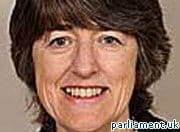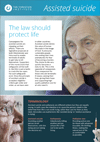Legalising euthanasia would give a green light to “hopelessness” and signal that terminally ill people would be better off dead, according to a leading end-of-life care expert.
Baroness Finlay of Llandaff, who is a Professor of Palliative Medicine at the University of Cardiff and a Peer, made the warning in wake of a campaign to legalise euthanasia.
Earlier this week Tony Nicklinson, a severely disabled man, began a legal campaign to force the Director of Public Prosecutions (DPP) to issue guidance clarifying whether his wife would be prosecuted for murder if she killed him.
Hopelessness
But Baroness Finlay cautioned: “Mr Nicklinson is severely disabled. But so are many other people and society has to ensure they are not viewed as second-class citizens; what he is proposing and the euthanasia lobby is backing gives a green light to hopelessness, signalling that the patient would be better off dead.”
And reflecting on Mr Nicklinson’s case she added: “Licensing death by appointment for him creates an expectation that those facing such a terrible loss of function have a burdensome decision – when do I opt for death?
“It is not heartless to provide for a person’s care needs; it is heartless to make them feel they ought to opt for death.”
Alter
The palliative care expert also warned that any relaxation of the existing laws on assisted suicide and euthanasia would fundamentally alter society’s view of death.
And pointing to the examples of Holland and Oregon, where assisted suicide is legal, she warned that what starts off as a few isolated cases of assisted suicide would soon “become the norm”.
Baroness Finlay also drew attention to the case of Richard Rudd, a paralysed father-of-two, who was about to have his life support machine turned off when he signalled to doctors that he wanted to live by using eye movements.
Thirst
She pointed to Mr Rudd’s case and warned that people are often incapable of knowing how they would feel if they experienced a similar situation.
She said: “The thirst for life is strong and kicks in even when we least expect it might.
“What we think about life-and-death matters when we are fit and well tells us nothing about what we will think if disaster strikes.
“Our ability to predict how we will feel is no more accurate than tossing a coin.”
The Baroness also points to a recent study, carried out by the Economist Intelligence Unit, which revealed that Britain offered the best end-of-life care.
Guidance
Earlier this year Keir Starmer QC, the DPP, issued guidance indicating that prosecutions for assisted suicide would be unlikely if the killer was “wholly motivated by compassion”.
Last month it was revealed that a retired GP who helped a cancer stricken man kill himself would not face trial, despite there being enough evidence to “provide a realistic” prospect of conviction.
Earlier in the year Dr Michael Irwin had written to Mr Starmer, and admitted helping terminally ill Raymond Cutkelvin commit suicide at the Dignitas facility in Switzerland.
Guidelines
Mr Starmer, drawing on his assisted suicide prosecution guidelines, announced that Dr Irwin wouldn’t stand trial because it was “highly unlikely” that a court would jail a 79-year-old man.
And in March it was revealed that the son of renowned conductor Sir Edward Downes, who helped his parents commit suicide, would not be prosecuted.
Mr Starmer revealed that Caractacus Downes would not be prosecuted despite there being sufficient evidence, claiming that a prosecution would not be in the public interest.



